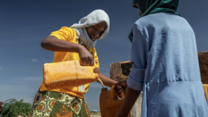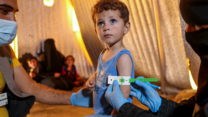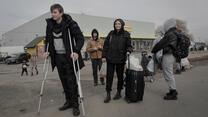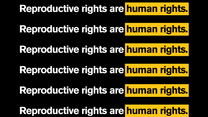Who we are
The mission of the International Rescue Committee (IRC) is to help people whose lives and livelihoods are shattered by conflict and disaster to survive, recover and gain control of their future. Our vision is that the IRC will lead the humanitarian field by implementing high-impact, cost-effective programs for people affected by crisis, and shape global policy and practice by sharing our learning and experience with others.
All IRC programs are designed to achieve meaningful change in people’s health, safety, education, economic wellbeing and ability to influence the decisions that affect their lives. The International Rescue Committee is a leading humanitarian agency dedicated to the health and survival of the most vulnerable people around the world. From the earliest stages of emergencies through recovery, we provide essential services.
For example, we:
- Provide primary health care services, including reproductive health, child health, nutrition and mental health
- Support environmental health services, including water, sanitation and hygiene
- Rebuild health systems, including information, quality assurance and governance systems
- Conduct research and monitoring to enlarge the evidence base on global health
- Make services more effective and sustainable by working across disciplines, with colleagues from children’s programs, economic recovery and development, governance and protection
Why our work matters
More than 51 million people have been forcibly displaced due to conflict and persecution. As a result, millions of people, particularly women and children, die each year of preventable causes in countries affected by crisis. Most of these deaths result from disruptions to sanitation, food, medicine and access to basic health care.
- Water and sanitation. Safe waste disposal, hand-washing with soap and safe drinking water could save the lives of 1.5 million children every year.
- Child survival. More than half of early child deaths are due to conditions that could be prevented or treated with access to simple, cost-effective interventions. Nearly half of all child deaths are linked to malnutrition.
- Reproductive health. Maternal deaths would drop by 67% if all women who wanted to avoid unintended pregnancies had access to family planning, and all pregnant women and their newborns had access to skilled care.
- Mental health. 14% of the entire world’s premature deaths and years lived with disability are attributed to mental, neurological and substance use disorders. 90% of individuals needing access to mental health care cannot access it.
What we do
IRC practitioners provide technical assistance to more than 30 country programs. Technical advisors are charged with staying abreast of the best available research and practices in their respective fields and sharing these with the IRC’s frontline teams. They also lead advocacy strategies to encourage partners and policy makers to adopt the interventions proven to be effective based on our research and experience.
Ensure access to water and sanitation services
The IRC provides essential facilities and resources to communities to prevent disease, increase personal safety and improve food security. In 2020, the IRC served 2.6 million people with newly built or rehabilitated water services, reached 3.1 million people with access to sanitation facilities, and reached nearly 3.8 million people with hygiene messages. Through research and programming, the IRC is improving humanitarian approaches to hygiene in crisis settings. For example, the IRC and Columbia University’s Mailman School of Public Health are collaborating on a research project to identify problems that women in crisis face with regards to menstrual hygiene management and solutions for responding relief agencies.
Increase sexual and reproductive health and rights
The IRC and its local partners are working to dramatically expand family planning coverage in conflict-affected communities. We prioritize access to contraception because it is the most effective way to reduce the number of unsafe abortions, maternal deaths and pregnancy-related disabilities; we also believe that women and girls have a right to determine when to become pregnant and their desired family size, regardless of where they live. In 2020, the IRC supported 225,000 clients in starting the use of contraception for the first time and supported nearly 180,000 births to take place at a facilities attended by a skilled health professional.
Improve child health
We deliver care for common childhood illnesses such as malaria, diarrhea, and pneumonia. Treatments are available in health facilities, via mobile clinics and in many places, directly in the communities through community health workers (CHWs) as part of integrated community case management (iCCM) and integrated management of newborn and child illnesses (IMNCI). We also support the delivery of routine immunizations to children in hard-to-reach areas.. In 2020 alone, the IRC provided 202,500 treatments to children under-five for pneumonia, diarrhea, and malaria.
Fight malnutrition, from the ground to the globe
The IRC works to increase access to, and continuity of, treatment for acute malnutrition through in-patient and out-patient care. Using evidence from our cutting-edge research, we’re simplifying diagnosis and treatment and bringing care closer to home. We’re also delivering high-impact preventive services through infant and young child feeding programs, lactation support for breast feeding women, cash vouchers, complementary feeding promotion, and micro-nutrient supplementation while also investing in nutrition integration across health, education, early childhood development and economic programming. In 2020, the IRC treated an estimated 410,000 children under give for acute malnutrition .
Address mental health and psychosocial needs
We integrate mental health and psychosocial support into our primary health programs while strengthening community support systems. This includes providing pharmacological and/or non-pharmacological care for conditions ranging from depression and anxiety to psychosis and bipolar disorders. In 2020, the IRC provided more than 82,500 consultations for mental health conditions.
Support people with Non-Communicable Diseases
The IRC provides care for crisis-affected people living with NCDs – hypertension, cardiovascular disease, diabetes, and chronic obstructive pulmonary diseases (COPD) – by integrating NCD programming into recovery and development efforts to ensure clients receive uninterrupted treatment. In some contexts, CHWs have been trained to support the management of NCDs through community follow up.In 2020, the IRC provided 956,600 NCD consultations.



